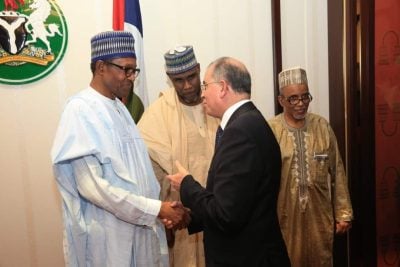
Billy Aderemi, a Lagos-based civil servant, was making big plans for his daughter, Emmanuela’s forthcoming 15th birthday slated for 10 October. During the three-month planning period, he set aside 10% of his N300,000 ($774) monthly salary to make the event memorable.
A day before the event, Aderemi went to a popular store in central Lagos to buy the cake, drinks and other items in readiness for the celebration but he was in for a shock.
“At the checkout, when the cashier handed me the total bill, I found out that the money could only cover half the cost. Prices for almost all the items had doubled. We decided to postpone the celebration till next month,” he lamented.
Aderemi is just one of the millions of Nigerians who are finding it difficult to cope with the rising prices of goods and services due to the steady rise in inflation.
According to Nigeria’s National Bureau of Statistics (NBS) the 22.02% inflation rate in August represented the seventh consecutive monthly rise and the highest figure since the 24.3% recorded in 2005. The August rate compares to 19.64% recorded in July.
Bismarck Rewane, an economist, blames exchange rate pass-through, forex scarcity and rising energy prices – the usual suspects – as the major factors behind the state of inflation in Nigeria.
For instance, the naira, which traded at N704/$ at the beginning of September, exchanged at N742/$ in the parallel market on 12 October.
A market price survey showed that cooking gas prices rose 101.17% to $11.48/5kg in the last year; kerosene rose 102.38% to $2.08/litre; diesel rose 209.54% to $2.03/litre, while petrol rose 14.89% to $0.49/litre.
Rewane expects inflation to sustain its upward trend in the months ahead, albeit at a slower pace due to dwindling forex inflows, soaring energy prices and spending on the 2023 general and Presidential election campaigns.
Pain points for economy
While the battle against inflation continues, the economy has been going through a grim period, with revenues from virtually all fronts declining.
Oil revenue, the major source of forex earnings declined as oil production was down to 1.1mbpd (below the OPEC quota of 1.8mbpd). Non-oil exports dropped 5.61% to $675.08m in Q2 from $715.19m in Q1 while oil theft is estimated at 400,000bpd. Crude oil prices dropped by 33% in July, August and September 2022.
Diaspora remittances, which peaked at $24bn in 2019, dropped to $19.2bn in 2021 due to increased leakages through unofficial channels.
Foreign direct investment declined by 5.02% in Q2 to $147.16m, from $154.97m in Q1, while foreign portfolio investment fell by 20.91% to $757.32m in Q2 from $957.56m in Q1. These negative indicators suggest a need for drastic measures to steady the economy.
CBN, banks fight back
At the September Monetary Policy Committee meeting in Abuja, the Central Bank of Nigeria (CBN) raised the benchmark interest rate from 14% to 15.5% and the Cash Reserve Ratio (CRR) by 5% to 32.5%. This represents 400 basis points’ cumulative interest rate increases in six months, the same increase as recorded in the last 10 years.
The CRR hike was to mop up liquidity from banks’ vaults and discourage currency speculation. It led to a $16bn debit to banks, 32.5% of the $49.2bn total deposits.
Those decisions pushed yields for 1-year T-bills from 6% to 12%, leading to bullish demand on the instruments.
Ike Chioke, Managing Director of Afrinvest West Africa, said the bullish reactions will continue as investors hunt for higher yields. “We maintain our advice to investors to trade cautiously and take advantage of relatively attractive bills across the curve, along with offers from corporates,” he said in emailed notes to investors.
To stop official funds from being used to buy government securities at a period of elevated yields, the CBN stopped banks from accessing the discount window on the settlement date for government securities auctions.
Angela Sere-Ejembi, the CBN’s Director of Financial Markets, said participants with successful bids at the government securities auctions such as for T-bills, bonds and sukuk, were not permitted to access the CBN discount window funds on the settlement date.
In order to stop people abusing the system of providing forex for genuine travellers, commercial banks have said they will no longer disburse Personal Travel Allowance (PTA) and Business Travel Allowance (BTA) dollars in cash. Instead, all transactions will be done on cards.
The policy shift, announced by many banks including FirstBank and Access Bank, followed rising cases of abuse by ‘travellers’ who obtain the forex but fail to use it for trip-related purposes or trade the funds at black markets.
Segun Agbaje, Group Managing Director of Guaranty Trust Holding Company Plc, said there had been incidences of customers presenting fake documents like expired passports, invalid flight tickets, or open tickets that are cancelled after they acquire the foreign exchange, giving them as examples of people abusing the system.
First Bank of Nigeria said that PTA and BTA will now be transferred to the FirstBank Travel Card. “The full Personal Travel Allowance (PTA) and Business Travel Allowance (BTA) ($4,000 and $5,000) respectively will now be disbursed to your FirstBank Travel Card. All applications will be in line with regulatory requirements,” the bank said.
Access Bank Plc also said it will now disburse PTA and BTA through its Access Travel Debit Card. “The Access Travel Debit Card has been created to enable customers to transact seamlessly when they travel abroad.
“It helps instant issuance for PTA/BTA requests, easy access to international transactions though point of sale, online and ATMs. All the unutilised sums on the card can be used for international transactions or other trips,” the bank said.
Banks have also suspended overseas ATM naira card transactions due to the persistent dollar scarcity and challenges faced by manufacturers and other real sector operators in sourcing forex.
First Bank said: “Due to current market realities on foreign exchange, you will no longer be able to use the Naira Mastercard, Naira Credit Card, our Virtual card and Visa Prepaid Naira card for international transactions. Please use your Visa Debit Multicurrency Card, Visa Prepaid (USD) Card and Visa Gold Credit Card to continue transacting abroad, with limits of up to $10,000.”
Zenith Bank Plc sent an emailed note to customers on the new payment plan abroad. It said: “Please be informed that we have temporarily suspended the use of Zenith Bank Naira cards for International Automated Teller Machine (ATM) cash withdrawals and PoS transactions.”
In July, Standard Chartered Bank suspended international transactions on its naira visa debit card. Fintech firms Flutterwave, Eversend and other fintech platforms had also stopped virtual card services for international transactions.
Views from other stakeholders
Razia Kahn, Standard Chartered Bank Regional Head of Research, Africa & the Middle East, called for greater reassurance on forex and other policy reforms for Nigeria to attract foreign investor participation.
“In terms of the policy response, Nigeria has perhaps been more tested than many other economies. A lot of the transmission of the different pressures into the great slowdown has been exacerbated by the policy decisions in Nigeria. Still, Nigeria stands apart from many of its African counterparts simply because it is seen to be an economy that has scale,” she explained.
Likewise, Ayodeji Adelagun, Head, Financial Markets, Standard Chartered Bank Nigeria, said the CBN’s decision on T-bills showed its readiness to do something about capital flows and investment in the economy. He said the CBN is also preparing ground locally, in case the foreign capital expected does not come in.
“In my mind, if the CBN is not able to access the offshore market, then it will play locally with the T-bills investments. There is a local market perspective and the offshore market perspective. But I think beyond expecting the funds, there should be forex reforms that allow investors ease of entry, and exit. If that does not happen, no matter the rates, foreign capital inflows won’t happen.”
The political campaigns hot up
Nigeria’s top four Presidential candidates in the 2023 general elections – Peter Obi of the Labour Party (LP), Bola Ahmed Tinubu of the All Progressives’ Congress (APC), Alhaji Atiku Abubakar of the People’s Democratic Party (PDP) and Rabiu Kwankwaso of the New Nigeria People’s Party (NNPP) have kick-started their political campaigns.
Rallies have started across major cities, and spending has increased. Daniel Kingsley, Abuja-based political commentator, said cash is already flowing: “Liquidity has increased due to political campaign and election spending. The increase in aggregate demand without a corresponding increase in aggregate supply will continue to stoke inflation.”
He expects the inflation uptick to persist as long as importers, traders and manufacturers, among others access only 5% of their dollar demand from the official market and 95% from the parallel market. School fees for international students are 70% sourced from the official market, and 30% from the parallel market. External debt service funds are sourced 100% from the official market even as global interest rate hikes compound debt servicing obligations.
Johnson Chukwu, MD of Cowry Asset Management Group, said the current global monetary developments such as the hike in policy rates by central banks in developed countries shaped the CBN’s decision on its rates rise.
He said Nigeria faces stiff economic headwinds as a sharp slowdown in global growth raises the risk of a prolonged recession.
“High and unstable inflation rates, unpredictable FX exchange rates, and an unhealthy labour market are banes to corporate performance. Interest rates are projected to remain elevated for the rest of 2022, thereby suppressing corporate valuations,” he commented.
Very significantly, whoever wins the 2023 elections will be faced with a stockpile of debt estimated at $100.2bn, maturing obligations, misaligned currency, high inflation and interest rates as well as an opportunity for reforms. Good luck to Nigerians as they face a period of tumult ahead.
Want to continue reading? Subscribe today.
You've read all your free articles for this month! Subscribe now to enjoy full access to our content.
Digital Monthly
£8.00 / month
Receive full unlimited access to our articles, opinions, podcasts and more.
Digital Yearly
£70.00 / year
Our best value offer - save £26 and gain access to all of our digital content for an entire year!
 Sign in with Google
Sign in with Google 



